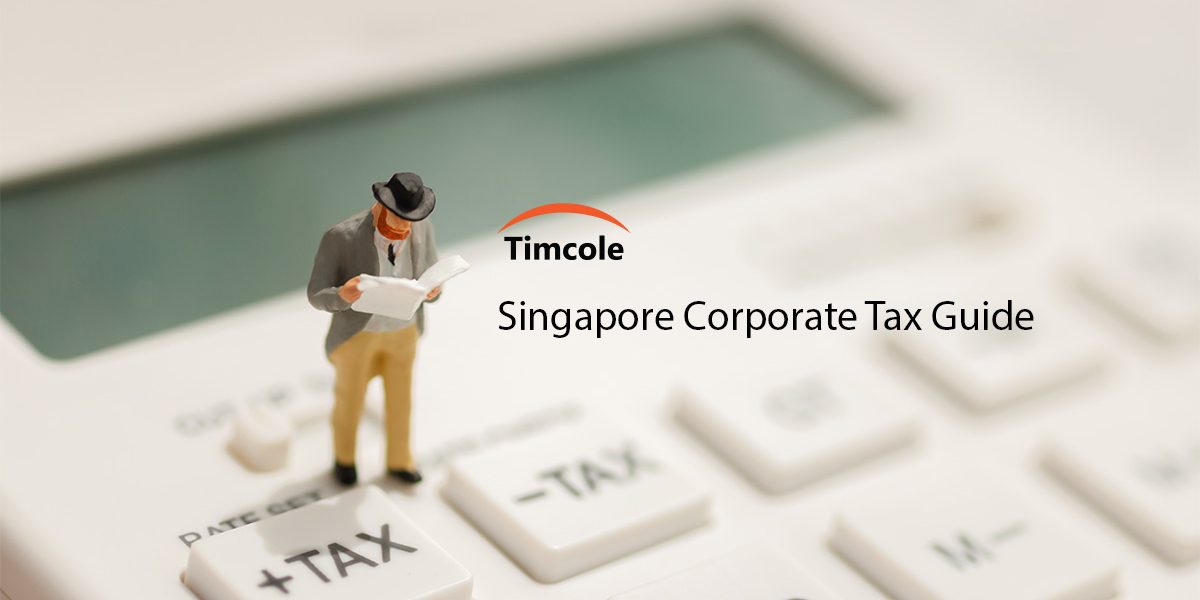Just like many other countries, Singapore uses its own corporate tax system, and all companies in the country have Singapore company tax number. Singapore uses the one-tier corporate tax system so that stakeholders won’t pay tax twice.
The rate of corporate income tax has remained at a flat rate of 17% since 2010. Tax is calculated based on the taxable income of the company. In Singapore, tax is not imposed on capital gains.
 Leave your corporate tax to the professionals.
Leave your corporate tax to the professionals.
Timcole offers bookkeeping, corporate tax filing, GST filing and compilation of financial statement services.
Not sure what you need? Contact us for a free consultation.
Effective Corporate Tax Rate for New Companies (FY 2020)
1. Start-up Tax Exemption Scheme (SUTE) for Singapore Companies
Here are the eligibility conditions for the tax exemption scheme:
- The number of shareholders must not exceed 20
- One of the shareholders must possess a minimum of 10% of the issued shares
- No property and investment holding qualifies
Although SUTE now extends to include companies by guarantee right from the year 2010, the tax exemption scheme for new start-up companies does not extend to investment holding companies and companies that engage in property development activities except such a company got incorporated before February 2013.
2. Partial tax exemptions
All companies that are not eligible for the SUTE scheme have the privilege to enjoy partial tax exemptions.
3. Corporate income tax (CIT) rebate
Corporate income tax rebate provides a way that helps businesses cope with endless restructuring and economic uncertainty. All companies that have Singapore company tax number qualify for the corporate income tax rebate. The CIT rebate for YA2020 is capped at $15,000, with a rebate percentage at 25% of the corporate tax payable.
The CIT rebate percentage during the last two years are as follows:
- For YA2019, it was at the rate of 20% of tax payable, and it was capped at $10,000.
- For YA2018, it was at the rate of 40% of tax payable, and it was capped at $15,000.
4. Exemption clauses for income that is foreign-sourced
Tax will be levied on foreign-sourced income paid to Singapore. However, the foreign-sourced income exemption scheme (FSIE) can help companies avoid tax in some cases. Sections 13 (7A) to 13 (11) of the Income Tax Act gives a detailed account of situations where the FSIE is applicable.
The category of foreign-sourced income:
- Foreign branch profits – These are profits made by a Singapore company that is registered as a branch in any foreign country. This doesn’t apply to non-business or non-trade income of the foreign branch.
- Foreign sourced dividend – This refers to a dividend paid by a non-Singapore tax resident company.
- Foreign-sourced service income – This refers to all incomes made by a resident taxpayer for all the services provided via a fixed location of operation in an overseas country.
5. Double Taxation
The issue of double taxation is bound to occur when tax is levied on the foreign-sourced income of a Singapore tax resident company and also when such income is paid into Singapore. Companies have the right to demand credit for the tax they paid in a foreign country against the tax that is payable in Singapore on the same income in line with the foreign tax credit (FTC) scheme of IRAS.
Here are the available types of credit or relief:
- Double tax relief (DTR) – In order to avoid double taxation and enhance trans-border trade, Singapore has signed more than 20 Free Trade Agreements (FTAs), 8 limited Avoidance of Double Tax Agreements (DTAs), and 74 comprehensive agreements. Therefore, a DTR serves as credit relief that counters the issue of double taxation.
- Unilateral tax credit (UTC) – In locations where DTA doesn’t exist, UTC becomes permissible when repatriated income is made by:
- income from consultancy, professional, and other services
- dividends income
- royalty income
- branch profits
- employment income
6. Singapore FTC Pooling System
The FTC pooling system was introduced in 2011, and it aims to simplify tax, make businesses more flexible in their FCT claims, and reduce the taxes levied on foreign-sourced income. Just like FSIE, FTC becomes applicable when the rate of headline corporate tax in a foreign country is at least 15% provided that such a particular country has already taxed the income.
 Effective tax planning can help you further save more money. Learn more about it here.
Effective tax planning can help you further save more money. Learn more about it here.
Save even more! Find out the incentives for your specific industry here.
Corporate Tax made Easier with Xero
 Xero is an online cloud accounting software used worldwide. It is known to be one of the best inventory management software for SMEs and a popular choice for corporate accountants.
Xero is an online cloud accounting software used worldwide. It is known to be one of the best inventory management software for SMEs and a popular choice for corporate accountants.
Xero is an approved IT solution for the Singapore PSG grant. With the PSG grant, get up to 80% subsidy for Xero set up and/or migration. Check your eligibility and pricing here.
Start applying now! Apply your PSG funding with our Step-by-Step Guide.








